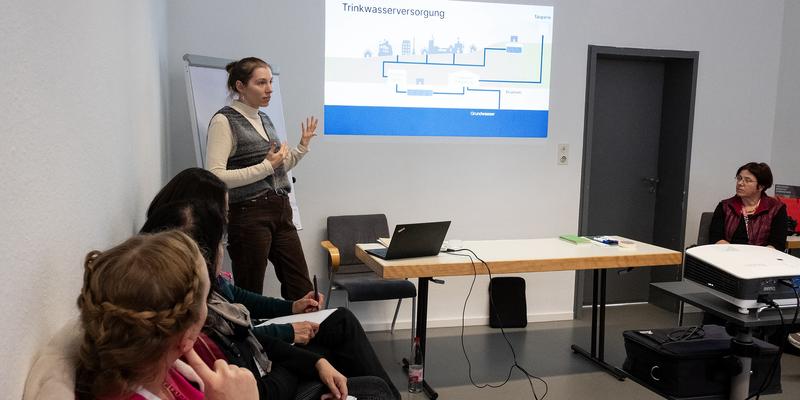Resilience of Drinking Water Supply
Workshop by Michaela Leštáková at the annual conference of the German Association of Women Engineers
Workshop by Michaela Leštáková at the annual conference of the German Association of Women Engineers

Drinking water is the most important and at the same time an irreplaceable commodity. Nevertheless, the availability and accessibility of water remains a global challenge: around 2 billion people worldwide do not have safe access to clean drinking water. And even in countries where the supply of drinking water seems relatively stable, crisis situations can lead to parts of the population having only limited access to it.
In the workshop “Resilience of drinking water supply - Which aspects should an engineer consider?”, which Michaela Leštáková held as part of the Annual Conference of the German Association of Women Engineers from 15-17.11.2024 in Frankfurt am Main, the participants dealt with exactly that issue: the supply of drinking water in crisis situations in Germany.
In an engineering context, the term resilience describes the ability of a system to deal with unexpected hazards and to cope with their consequences [^1]. Some authors define resilience more precisely: a resilient technical system guarantees a predefined minimum level of functionality even in the event of a disruption and enables the original functionality to be restored [^2].
In the workshop, we discussed the various facets of the definition of resilience. One central aspect was the question of how the minimum functionality of a technical system can be defined. This definition often implies a reduction in the amount of water provided to consumers. Ensuring the resilience of a technical system therefore also requires strengthening the individual and social resilience of consumers, i.e. the population.
In the interactive part of the workshop, we deepened these aspects. Using a case study - a sudden interruption to the water supply in Frankfurt am Main - the participating engineers put themselves in the role of planners. Their task was to develop a tool for the optimal replacement and emergency water supply. In a brainstorming session, the requirements for the fairest possible pipeline-independent emergency water supply were developed. It quickly became clear that the solution to such complex challenges can only be tackled effectively through interdisciplinary cooperation, as we know it from emergenCITY.
The most important requirement for the emergency water supply was the accessibility of the distribution points. The participants suggested basing this on schools, as schools are often very easily accessible. Another important point was the diversification of water sources, for example by collecting rainwater in order to increase resilience to water shortages.
In addition, participants suggested to develop an app that facilitates neighbourhood help or the organization of a pick-up and delivery service to support especially people with limited mobility. This idea is already one of the topics addressed in emergenCITY, e.g. in the mission ReSON, which led to the development of PairSonic.
In conclusion, the workshop shows how important it is to look at the resilience of drinking water supply from different perspectives. In particular, interdisciplinary cooperation and the exchange of ideas play a central role in meeting the complex requirements in crisis situations. Formats such as this workshop highlight the relevance of joint planning and reflection to create sustainable and practicable strategies for the future.
Michaela Leštáková is researching the resilience assessment of co-dependent urban water supply networks at the Institute of Fluid Systems Engineering at TU Darmstadt. At emergenCITY, she is a research associate in the Cyber-Physical Systems program area.